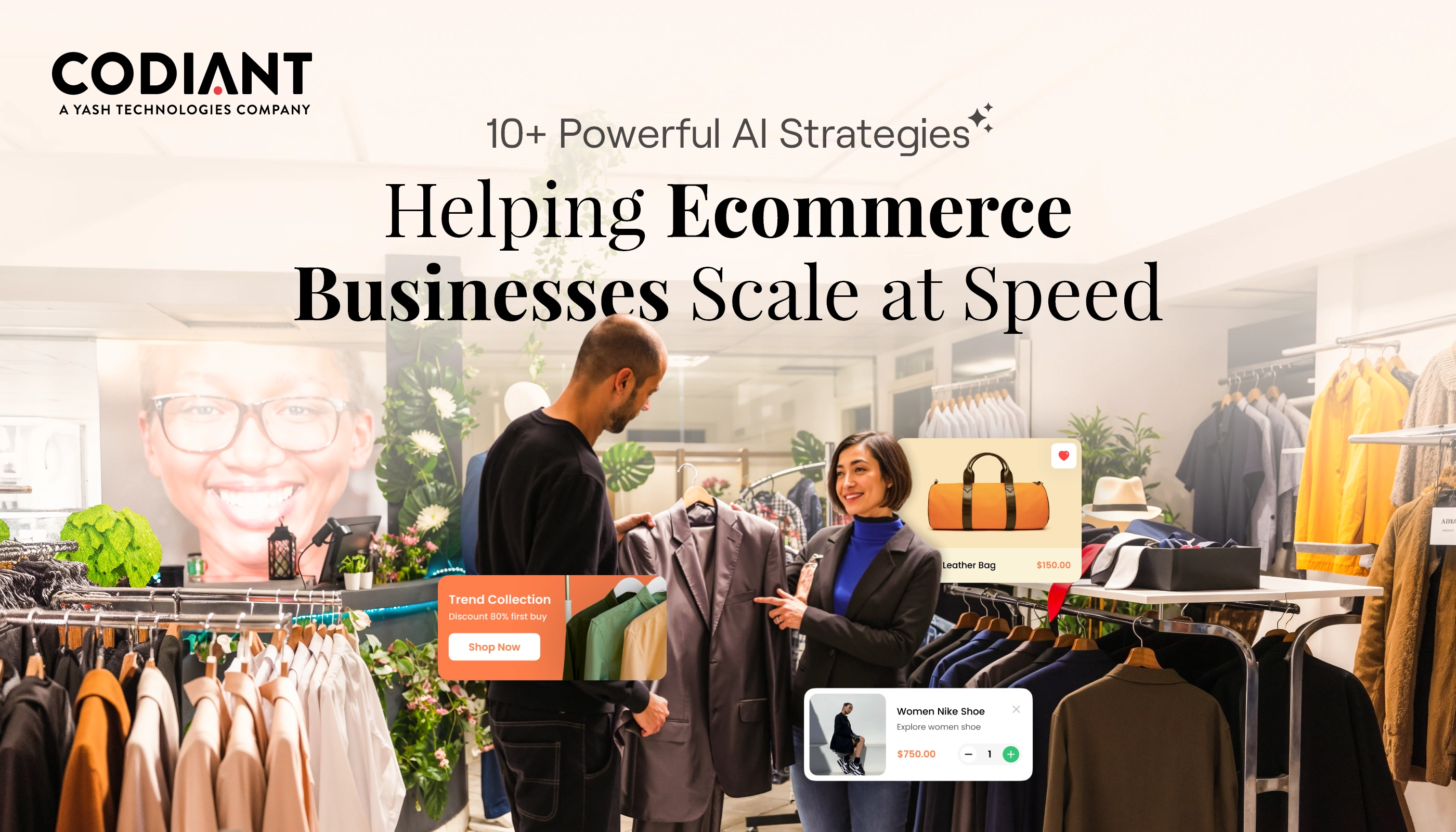The Definitive Guide To Understand Multi-Store E-commerce
Table of Contents
Subscribe To Our Newsletter

Having a highly diversified e-commerce store comes with its own set of challenges for the owner. Handling and managing each customer, especially based on their personalized requirements is not at all a piece of cake.
However, such a hassle can be minimized to a great extent by introducing a dedicated shop for each of your audience. In simple words, you can develop a multi-store e-commerce platform with a Complete e-commerce solution.
Running a multi-store e-commerce platform allows you to sell specific products to a particular audience with personalize messages and marketing strategies, and serve relevant product suggestions to the chosen group.
It sounds to be a very effective solution but can give you a nightmare to manage each store individually and juggle multiple credentials to handle all the processes.
However, it’s not the case with multi-store e-commerce solutions where you can easily manage your multiple e-commerce stores from a single place.
Let’s delve deeper to understand the concept, benefits, features, cost, and platform that empower multi-store e-commerce development.
What is an E-commerce Multi-Store?
An E-commerce multi-store is a software solution that lets the owner control or views more than one store from a centralized place. The store owner can handle multiple business operations from a single account or software.
This method enables aiming at the specific target audience of the store, rather than reaching out to the interested and not-so-interested audience from one storefront.
For example, if your business is diverse and has different audiences/users for that, then you can create a different store view for each business suitable for the user’s experience. It will help you to promote products specifically to the right audience with a personalized message.
The categorization of businesses with individual stores allows for having their own niche, pricing, inventory, or offers. To streamline all the business operations, you can go with an e-commerce multi-store that can serve customers based on their preferences in different aspects.
With the multi-store e-commerce platform, you can easily customize everything to the store, without hampering any user’s experience or business operations in ui-ux development.
Extraordinary Benefits of Multi-Store E-commerce Marketplace

The e-commerce marketplace in no time has become a vital tool for B2B and B2C marketing. This evolving trend has also evolved the purchasing or buying patterns of manufacturers, distributors, buyers’ committees, and customers. All these consumers prefer buying products from a trustable source, regardless of the original manufacturer.
The multi-store e-commerce platform offers various benefits to all of its multiple stakeholders.
Benefits for The Client
- For high-profile and important customers, the store can be client-branded.
- Authorized users can easily purchase available products over a specific dollar value.
- The automatically filtered catalogs allow the user to order only company-approved products.
- Ordering becomes quick and easy for all buyers through punch cards, reordering, bulk orders, and a quick ordering facility.
Benefits for Store Owners & Sellers
- The store owner can get a number of automated software solutions integrated into the platform to streamline operations, such as ERP, CRM, etc.
- Digital stores detailed SEO along with relevant keywords and meta descriptions can promote business in the competitive market.
- Supports multiple modes of digital payments and can even save and retrieve credit/debit card details securely while complying with government regulations.
- The store owner can have detailed access to the customer’s details, along with order history, wishlist, and order management.
- Store owners can access the customized RMA modules to carry out returns and exchanges with ease.
Benefits For The Administrative Staff
- ERP integration facilitates order and inventory from the client’s custom portal.
- An e-commerce platform can infuse a general or custom theme into each store.
- Cloud-based E-commerce marketplace offers unlimited platform scalability.
- The custom client portal offers easy-to-order and inventory management.
- Customer support can be centralized for all digital stores.
Benefits for The Distributor
- Distributors can identify and define which products they like to update, update prices and build branding strategies.
- The distributors can also control their set of operations within the website or marketplace platform.
- Bulk import and EDI integration support automated inventory management and product price handling.
- The operation managers can handle all the orders, inventory management, order and delivery monitoring, and customer assistance through the centralized distribution portal.
Benefits for Business Franchises
- The master franchise can keep a close tab on their franchisee’s order key products.
- The franchises can maintain their pricing, products, schedules, payment, and shipping methods.
- The robust marketplace platforms offer franchise-tiered management that can support both centralized and de-centralized management of franchises and franchise groups.
- Marketplaces can offer their clients some advanced services, such as updated catalog pictures, and compelling video and language translation facilities.
Significant Features of E-commerce Multi-Store
1. Stores Override Prices
With multi-stores, you can promote your profit earnings by availing of different pricing abilities for your advanced e-commerce store. The store owner can instantly override the product prices based on the store and list the same product at different amounts for different regions or the deal/offers provided at each store.
2. Store-Specific Discounts
By offering different and store-specific discounts on your multi-store e-commerce solution – you can easily attract more customers. The store-specific discount feature will allow you to offer unique and different discount rates for each store and track the accurate sales and discount details of each e-commerce store.
3. Store Specific Coupon Codes
Integrating coupon code generator features can influence visitor opinion and generate an ambiance of flash sales for an unsaid period of time. The user with coupon code can avail of varied offers which ultimately influence customer shopping behavior, double the sales, and builds a trustable relationship with the customer simultaneously.
4. Selection of Store
A multi-store presence of a business easily pushes it to reach a wider audience and this feature allows them to choose the store based on their preferences i.e. offers, location, language, needs, etc. The user can easily explore multiple stores and on their convenience and experience with the platform can easily place an order.
5. Store-Specific Categorization
Define product categorization based on the store type and the audience segmentation. Aim to provide an interactive environment that makes product search easier through the store-specific categorization feature. This feature allows you to assign different products to each e-commerce store simply by selecting and adding the product to the store inventory.
6. Performance and Analytics Tools
This feature offers a live dashboard to track the platforms and products’ performance and analytics. With this tool, you can analyze the detailed report of your sales, inventory, earnings, customer shopping behavior, and various other details. Apart from that, can get an auto-generated report on customers, sales, conversion rate, payment modes, and various other reports, and can perform report comparison as well against days/months/weeks/years.
7. Store-Specific Delivery Charges
To remain ahead of competitors, ensure the best delivery experience and the most convenient charges for the customer. The delivery charges can be optimized based on the area and the various offers implied in the order (if any) at different e-commerce stores. This feature allows to optimization of the e-commerce store specifically for the shipping charges.
Core Features of A Future-Ready Multi-Store E-commerce Solution
1. Products Management
With a custom-developed multi-store e-commerce marketplace, you can efficiently manage your products or inventory and can add ‘n’ a number of products with variants (size, color, style, etc.), categories, brands, and other details with a number of available stock and maximum order quantity filter with description and much more.
2. Logistics Management
Accurate logistics management with safe and timely logistics delivery boosts customer experience by multiple folds. It will ultimately elevate the customer reach and conversion rate with logistics and transport services. You can retain and engage the customer on your platform by letting them be informed with accurate information about their deliveries and frequent progress updates. This gives the admin and the customer assistants to have accurate information about the order and assists customers as needed.
3. Order Management
The multi-store e-commerce solution can offer your customers a highly convenient and customer-friendly experience with Single Page Checkout, Cart Abandonment Recovery, Order Product Update, Custom Checkout Options, Guest Checkout, and many more. Such streamlined processes promote user experience and support you build the best multi-store solution.
4. SEO Ready Solution
The E-commerce multi-store marketplaces are designed while considering the standard SEO guidelines and customized strategies. To build such projects, we ensure to integrate of automated features to simplify digital marketing and SEO-optimized themes for an appealing brand presence, and so on. An SEO-optimized platform promotes business presence, and ranking, and ultimately boosts the business revenue.
5. Marketing, Promotions & Discounts
Businesses adopt multi-store E-commerce solutions to simplify and empower their marketing strategy. To make this possible, we ascertain to integrate the best marketing tools, including Google Adwords, AI-enabled chat, email marketing tools, affiliate marketing, and others. All these tools drive easy and instant interaction with the customer in real-time and track their behavior on the platform to suggest the best solutions and formulate advanced marketing strategies.
Platforms That Empower Multi-Store E-commerce Marketplace

1. Adobe Commerce or Magento
Adobe Commerce is an enterprise-level e-commerce platform that caters to the needs and budgets of all company sizes through Starter ($1,999 a month) and Pro ($3,999 a month) plans. The platform offers in-built multi-store functionality to its users with a wide range of ready-made design templates.
Adobe Commerce makes it easier for its clients by offering a variety of hosting options, it includes AWS-hosted SaaS applications, on-premises deployment, or hosted on a public or private cloud. The platform had a wider presence in B2B and B2C markets.
2. Salesforce Commerce Cloud
Salesforce is a leader for Digital Commerce in the 2022 Gartner Magic Quadrant. The platform is specially designed to handle the demands and build the best possible solution for multi-stores by integrating apt capabilities. However, the platform doesn’t provide definite charges to its vendor, rather it provides exact prices on request based on the project size considering various other details.
Salesforce Commerce offers its clients an embedded AI-driven personalization with strong omnichannel features to provide the best personalized offline experience. The platform offers its services and solutions for both B2B and B2C markets.
3. BigCommerce
BigCommerce offers top-quality enterprise-level functionality and a well-designed app-based system. There are several apps available in the market that allow its clients to entirely customize their BigCommerce store. To make this possible, the client can even integrate the marketplace with other platforms too, such as WordPress, Drupal, Stripe, Amazon, Mailchimp, and more.
The platform is very cheap for businesses to avail – initially, it is available on a free one-month trial, whereas paid plans start at the nominal charge of $29.95 per month. The platform is designed to scale businesses and allow companies to grow at a pace they like. It can work effectively for both B2B and B2C sectors.
4. Shopify
Shopify is a widely used e-commerce software on the market today. Its variety of features and plug-ins help to build a highly customized and scalable marketplace. This platform encourages the integration of various systems with the e-commerce store, including ERP, CRM, CMS, and PIM. Apart from that, it also offers various apps for convenient services like Slack, Mailchimp, Google Sheets, Amazon, and more.
Shopify is initially available for a free trial with a regular subscription plan starting at $29 per month. The Shopify Plus SaaS enterprise-level service charges $2,000 per month. It is an effective platform for both back-end and front-end designing.
Summing It Up
Different types and sizes of e-commerce owners offer their services in the market. Likewise, their requirements and budget also vary to a great extent, and to cater to the wider customer market multi-store e-commerce solution is the suitable choice.
Taking the business to the multi-store listing software pushes businesses to grow at a rapid pace, improves profitability, and meets their needs. But it is not at all an easy task for a diverse business owner to switch their business from a single store to a multi-store concept. To make all this possible, only expert professionals are required, such that all the existing data doesn’t get compromised but rather gets organized in an advanced manner.
Well, in all this struggle, Codiant can be your right technology partner of choice. We have been an expert web and app development company for decades and have exceptionally versed techies to build small to large-scale multi-store e-commerce platforms catering to all your business needs. Connect with us, for further consultation and assistance.
Featured Blogs
Read our thoughts and insights on the latest tech and business trends
How AI Helps eCommerce Businesses Scale Faster: 10+ Proven Strategies
- December 4, 2025
- Artificial Intelligence E-commerce
Running an eCommerce business today means managing more products, more customers, and more data than most teams can handle manually. As order volumes rise, tasks like customer support, inventory planning, product discovery, and marketing start... Read more
How to Choose the Right AI Solutions for Your Existing App
- December 1, 2025
- Artificial Intelligence
Businesses today are under pressure to move faster, deliver personalized experiences, and operate with greater accuracy. This is why many enterprises and startups are now looking for ways to add AI features to their mobile... Read more
How to Enable AI for Smart Diet Planning and Client Progress Tracking
- November 26, 2025
- Artificial Intelligence
Smart diet planning and consistent progress tracking have become essential in a world where people want faster, more accurate ways to manage their health. Traditional methods like manual calorie counting or generic meal charts often... Read more




